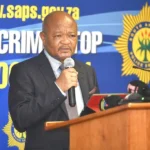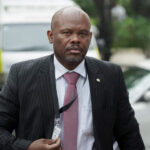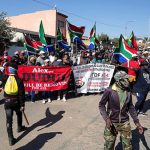In the aftermath of the recent elections, the South African political landscape is abuzz with talks of power-sharing and potential coalitions. The African National Congress (ANC), which witnessed a loss of majority in Parliament and key provinces, is now engaged in a delicate horse-trading process to form the country's seventh administration. As the ANC's National Executive Committee (NEC) convenes today to chart the way forward, the party finds itself at a crucial crossroads.
Yesterday, the ANC held a media briefing to provide an update on the ongoing discussions with various political parties. The party revealed that it has engaged in exploratory meetings with a range of potential coalition partners, including the Inkatha Freedom Party (IFP), the Economic Freedom Fighters (EFF), the Democratic Alliance (DA), the National Freedom Party (NFP), and the Patriotic Alliance (PA). Notably, attempts to initiate talks with the uMkhonto weSizwe (MK) party have been unsuccessful thus far.
In a media briefing held yesterday, ANC secretary-general Fikile Mbalula provided an update on the ongoing discussions, shedding light on the exploratory meetings with several opposition parties. The ANC has engaged with the Inkatha Freedom Party (IFP), the Economic Freedom Fighters (EFF), the Democratic Alliance (DA), the National Freedom Party (NFP), and the Patriotic Alliance (PA). However, attempts to initiate talks with the uMkhonto weSizwe (MK) party have been unsuccessful.
Mbalula further emphasized the importance of a sober and informed debate within the ANC. He acknowledged that the situation of forming coalitions at a national level was not previously anticipated, but stressed the need for ANC members to express their views and engage through appropriate party platforms and channels.
"We are not robots," Mbalula stated, affirming that NEC members would be allowed to voice their dissent and contribute to the decision-making process. He urged party members to respect the leadership's decision while acknowledging the concerns raised by some members who staged a picket outside Birchwood Hotel.
The dissenting members, who oppose any coalition or Government of National Unity that includes the Democratic Alliance (DA), expressed their discontent, emphasizing their position against such a partnership. Mbalula acknowledged their right to protest and assured that their voices would be considered.
"We respect the leaders when coming to a decision," said Kay Sexwale, one of the protesters. "We are here to register our discontent with the ANC in any shape or form going into coalition with the DA."
With less than two weeks remaining before the first sitting of the National Assembly, the ANC faces the pressing task of forming a government. The party has expressed a preference for convening a Government of National Unity (GNU), akin to the arrangement seen after the 1994 elections. This approach aims to create a multiparty arrangement that serves the best interests of South Africa, as expressed by its citizens.
ANC spokesperson Mahlengi Bhengu-Motsiri highlighted the desire of South Africans for parties to work together, stating, "The conversation is looking at a government of national unity because this is what the people of South Africa have said to us: put together a multiparty arrangement that works for the benefit of South Africa."
While a GNU may help the ANC avoid aligning with potentially unpopular coalition partners, the wide-ranging ideologies among the involved parties pose risks of instability and gridlock. Building consensus and managing diverse interests would be crucial in such a government.
The ANC, Democratic Alliance, and Inkatha Freedom Party have already engaged in initial talks, though they are still in the early stages. DA leader John Steenhuisen emphasized the importance of parties that respect the rule of law, the Constitution, and seek stability and growth engaging in mature discussions about the way forward. However, both the DA and IFP have made it clear that they will be selective about their coalition partners, with parties that do not uphold the constitution being deal-breakers.
Two potential working relationships have been proposed for the ANC, DA, IFP, and other smaller parties: a "confidence and supply agreement" or a coalition agreement. A confidence and supply agreement would see parties supporting the government in motions of confidence and appropriation votes, while retaining the freedom to vote based on their own policies or conscience on legislative bills. Such an agreement could allow the ANC to maintain executive power while granting the DA control over the legislature.
The second option, a coalition agreement, would involve all parties entering the executive, potentially leading to a more stable government due to consolidated agreement. However, critics argue that this option could alienate some ANC supporters, and finding common ground on policy positions might prove challenging, particularly given the ideological differences between the ANC and the DA.
Political analyst Dr Nicole Beardsworth from Wits University highlighted the differing preferences for coalition partners among factions within the ANC. She noted that Deputy President Paul Mashatile's faction would likely favor working with the EFF, while party chairperson Gwede Mantashe seemed open to partnering with either the EFF or MK.
The ANC has also had preliminary talks with the EFF and the Patriotic Alliance, but has been unsuccessful in contacting the MKP. While a confidence and supply agreement is a possibility, party leaders in the EFF and PA have expressed a preference for a coalition agreement. These potential coalitions could consist of the ANC-EFF-PA, ANC-EFF-IFP, or ANC-MK-EFF, each with varying seat numbers in the National Assembly.
The EFF, known for its calls for land expropriation without compensation and nationalization of key sectors, has also demanded key positions such as the National Assembly speaker and the finance minister portfolio. The PA has remained steadfast in its stance on mass deportation, which could complicate negotiations with other partners.
As the ANC navigates the intricate web of coalition negotiations, it faces the challenge of making significant concessions and balancing the interests of various factions within the party. The outcome will shape South Africa's future and determine whether the seventh administration can effectively address the nation's pressing issues.
ANC secretary-general Fikile Mbalula concluded the media briefing by acknowledging the concerns expressed by ANC members outside the Birchwood Hotel, where the NEC meeting is taking place. He emphasized that the leaders are committed to finding a solution that will advance the country's interests and honor the will of the electorate. The ANC remains hopeful that an agreement can be reached before the first sitting of the National Assembly, allowing for a smooth transition of power and the formation of a government that can address the challenges facing South Africa.
As the negotiations continue behind closed doors, the nation eagerly awaits the outcome, hoping for a stable and effective government that can tackle pressing issues such as unemployment, inequality, corruption, and service delivery. The ANC's ability to navigate the complexities of coalition-building and find common ground with potential partners will be crucial in shaping the country's political landscape for the next term.

Follow Us on Twitter










